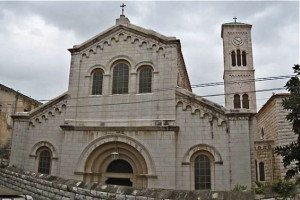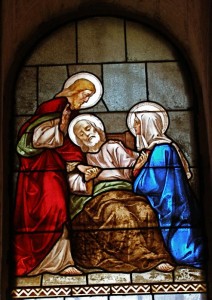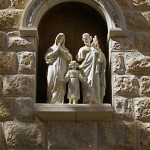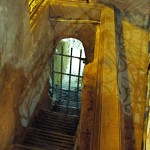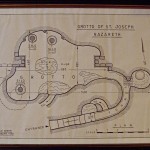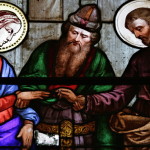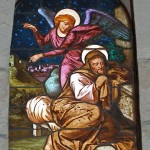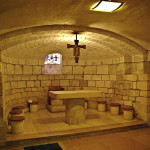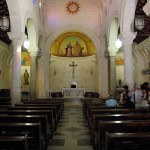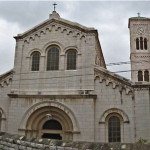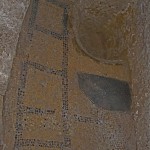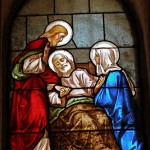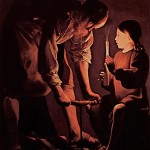Israel
A fond tradition asserts that the Church of St Joseph in Nazareth is built over the carpentry workshop of the husband of the Virgin Mary.
The church (also known as the Church of the Nutrition and the Church of Joseph’s Workshop) is a solid and unpretentious building. It stands very much in the shadow of the soaring cupola of the Church of the Annunciation on its southern side — just as St Joseph himself lived in the shadow of Jesus and Mary.
But there is no evidence that the cave over which the church is built was Joseph’s workshop. Even if this is the site of the Holy Family’s home, the cave is unlikely to have been a carpentry workshop in the modern sense.
The Gospels use the Greek word tekton, meaning builder or artisan, to describe Joseph. He most likely worked with both stone and wood, since stone was the common building material in the area.
Joseph’s work may have taken him away from his home. A likely place of employment was the Roman city of Sepphoris or Tzippori, which was being rebuilt by Herod Antipas at the time the Holy Family arrived from Egypt. The building site was a 50-minute walk from Nazareth.
Cave system under church
The Church of St Joseph was built in 1914 on the remains of a Crusader church and over a cave system. The first mention of the site occurs in the work of a 17th-century Italian writer and Orientalist, Franciscus Quaresmius, who described it as “the house and workshop of Joseph”.
The apse of the church has three noteworthy paintings: The Holy Family, The Dream of Joseph, and The Death of Joseph in the Arms of Jesus and Mary.
A stairway in the church descends to a crypt where caverns can be seen through a grille in the floor. Seven further steps lead to a 2-metre square basin or pit with a black-and-white mosaic floor. This is believed to have been a pre-Constantinian Christian baptistry, perhaps used as early as the 1st century.
Beside the basin, a flight of rough steps leads down to a narrow passage which, after turning 180 degrees, opens into an underground chamber 2 metres high.
Off this are openings to grain silos and water cisterns, cut into the soft limestone rock by early dwellers. Such underground repositories were typical of ancient Nazareth.
Other sites in Nazareth:
In Scripture:
Joseph takes Mary as his wife: Matthew 1:18-25
Administered by: Franciscan Custody of the Holy Land
Tel.: 972-4-6572501
Open: 8am-6pm
- Statue of Holy Family at Church of St Joseph (Seetheholyland.net)
- Stairs under Church of St Joseph (Seetheholyland.net)
- Plan of grotto under Church of St Joseph (Seetheholyland.net)
- Betrothal of Mary and Joseph, stained glass in Church of St Joseph (© Tom Callinan / Seetheholyland.net)
- Joseph’s dream, stained glass in Church of St Joseph (Seetheholyland.net)
- Chapel in Church of St Joseph (Berthold Werner)
- Interior of Church of St Joseph (Berthold Werner)
- Church of St Joseph, Nazareth (Seetheholyland.net)
- Baptismal basin in grotto of Church of St Joseph (Seetheholyland.net)
- Death of St Joseph, stained glass in Church of St Joseph (Seetheholyland.net)
- St Joseph the Carpenter, by Georges de La Tour (Musee du Louvre, Paris)
References
Brownrigg, Ronald: Come, See the Place: A Pilgrim Guide to the Holy Land (Hodder and Stoughton, 1985)
Doyle, Stephen: The Pilgrim’s New Guide to the Holy Land (Liturgical Press, 1990)
Freeman-Grenville, G. S. P.: The Holy Land: A Pilgrim’s Guide to Israel, Jordan and the Sinai (Continuum Publishing, 1996)
Gonen, Rivka: Biblical Holy Places: An illustrated guide (Collier Macmillan, 1987)
Joseph, Frederick: “Basilica of the Annunciation in Nazareth”, Holy Land, spring 2005
Kilgallen, John J.: A New Testament Guide to the Holy Land (Loyola Press, 1998)
Murphy-O’Connor, Jerome: The Holy Land: An Oxford Archaeological Guide from Earliest Times to 1700 (Oxford University Press, 2005)
Walker, Peter: In the Steps of Jesus (Zondervan, 2006)
Wareham, Norman, and Gill, Jill: Every Pilgrim’s Guide to the Holy Land (Canterbury Press, 1996)
External links

